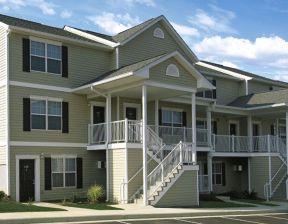
Copper Beach Townhomes
A growing body of evidence suggests Campus Crest Communities is a poorly run company that turns out an inferior product. But that hasn't kept similar companies from cutting deals with it--or Wall Street investors from throwing dollars at it.Do corporate big dogs see something in Campus Crest that everyday consumers can't see? Is the investment world unconcerned about the company's questionable ethics and shaky operations as long as the bottom line produces favorable numbers?
The answer to both questions appears to be yes. But perhaps its time investors put themselves in the shoes of employees and customers who have seen the real-world view that Campus Crest has successfully hidden from Wall Street.
Charlotte-based Campus Crest has developed student-housing complexes, under The Grove banner, near some 40 public universities around the country. The company is of special interest here at Legal Schnauzer for three primary reasons: (1) It has Grove sites operating or planned at four Alabama institutions (South Alabama, Troy, Jacksonville State, and Auburn); (2) CEO Ted Rollins played a central role in a Shelby County divorce case that caused his ex wife, Sherry Carroll Rollins, and their two daughters to wind up on food stamps; (3) Campus Crest's chief corporate law firm is Birmingham-based Bradley Arant.
We have reported, along with the mainstream press, on all sorts of operational problems at Campus Crest. Those include discrimination lawsuits at corporate headquarters; a balcony collapse that led to serious injuries in Denton, Texas; and mold, heating, and water problems at Orono, Maine.
For good measure, we have reported extensively on Ted Rollins' personal ethical lapses--including a conviction for assault on his 16-year-old stepson, an investigation for child sexual abuse of the same stepson, and perjury in his Alabama divorce case.
If the business community is concerned about any of this, it's hard to tell.
First came reports that Campus Crest had reached agreement to acquire Copper Beach Townhome Communities, which has been a major player in the student-housing sector for about 20 years. Lawyers from Bradley Arant helped orchestrate the transaction. Here is what made Copper Beach an attractive target for Campus Crest:
Copper Beech, which was founded in 1994, is the fifth largest student housing operator in the United States, with a portfolio of approximately 16,645 beds. For 20 years, it has been a vertically integrated developer, owner and operator of a unique, market-tested, branded town-home student housing product. The Copper Beech portfolio consists of 35 student housing properties, including two phase II development properties scheduled to open in fall 2013, plus one undeveloped land parcel in Charlotte, NC and Copper Beech's corporate office building in State College, PA. Copper Beech has utilized its vertically integrated platform to develop 30 of its 35 properties. As of February 13, 2013, the operating portfolio had an average occupancy of 98.5%, marking three consecutive years with occupancy levels in excess of 98%.
Then came news that Campus Crest had closed on a $300-million stock offering, designed primarily to fund investment in the Copper Beach portfolio. By our unofficial count, that brings Wall Street's total investment in Campus Crest to about $730 million.
All of this comes with a load of irony. Copper Beach is based in State College, Pennsylvania, and its founders and CEOs are John and Jeanette McWhirter. In 2010, the McWhirters were among the largest donors to Penn State University.
Why is that ironic? We will examine that question in a series of upcoming posts.
(To be continued)
